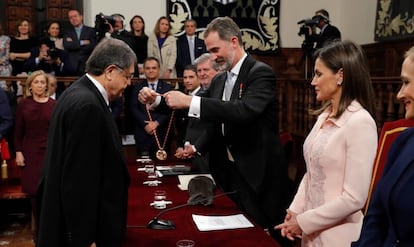Sergio Ramírez dedicates Cervantes Prize to “murdered Nicaraguans”
The author of ‘Divine Punishment’ underscores literature’s responsibility in denouncing injustice


“I write between four walls, but with the windows wide open,” said Nicaraguan writer Sergio Ramírez on Monday as he accepted the Cervantes Prize in Alcalá de Henares, near Madrid.
The former Sandinista Front politician, who has since become a critic of Nicaraguan President Daniel Ortega’s regime, received the prestigious literary award at a ceremony presided by the king and queen of Spain and also attended by Prime Minister Mariano Rajoy. He is the first Central American writer to be honored with a Cervantes in the prize’s 42-year history.
To close one’s eyes is to betray one’s craft
The 75-year-old writer, intellectual and former revolutionary dedicated the Spanish-speaking world’s top literary honor to the people of Nicaragua who have suffered political repression in recent times.
“Let me dedicate this prize to the memory of the Nicaraguans who in recent days have been murdered on the streets after demanding justice and democracy, and to the thousands of youths who continue to fight with nothing more than their ideals to make Nicaragua a republic again,” he said in his speech.
“As a novelist I cannot ignore the constant abnormalities of the reality in which I live,” said Ramírez, who was vice-president of his country between 1985 and 1990 with the leftist Sandinistas. “To close one’s eyes is to betray one’s craft.”
I write between four walls, but with the windows wide open
He also warned that literature has a duty to speak for the “victims of arbitrary power that turns their lives upside down, of the demagogue power that divides, separates, confronts and knocks people down. That power that carries within its nature neither compassion nor justice and thus imposes itself excessively, cynically, cruelly.”
Surrounded by his wife Tulita, their three children and eight grandchildren, the author of Margarita, How Beautiful the Sea had words of praise for another famous Nicaraguan writer, Rubén Darío (1867-1916), father of the Modernismo movement, and also for fellow writers who were part of the Latin American boom, such as Carlos Fuentes, Gabriel García Márquez, Julio Cortázar and Mario Vargas Llosa.
Ramírez has recently published his memoirs, Adiós Muchachos: A Memoir of the Sandinista Revolution, in which he talks about his revolutionary years.
English version by Susana Urra.
Tu suscripción se está usando en otro dispositivo
¿Quieres añadir otro usuario a tu suscripción?
Si continúas leyendo en este dispositivo, no se podrá leer en el otro.
FlechaTu suscripción se está usando en otro dispositivo y solo puedes acceder a EL PAÍS desde un dispositivo a la vez.
Si quieres compartir tu cuenta, cambia tu suscripción a la modalidad Premium, así podrás añadir otro usuario. Cada uno accederá con su propia cuenta de email, lo que os permitirá personalizar vuestra experiencia en EL PAÍS.
¿Tienes una suscripción de empresa? Accede aquí para contratar más cuentas.
En el caso de no saber quién está usando tu cuenta, te recomendamos cambiar tu contraseña aquí.
Si decides continuar compartiendo tu cuenta, este mensaje se mostrará en tu dispositivo y en el de la otra persona que está usando tu cuenta de forma indefinida, afectando a tu experiencia de lectura. Puedes consultar aquí los términos y condiciones de la suscripción digital.








































